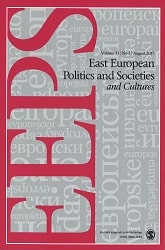Memorial Narratives of WWII Partisans and Genocide in Belarus
Memorial Narratives of WWII Partisans and Genocide in Belarus
Author(s): Alexandra GoujonSubject(s): Political history, Government/Political systems, WW II and following years (1940 - 1949), Transformation Period (1990 - 2010), Fascism, Nazism and WW II, Politics of History/Memory, Politics and Identity
Published by: SAGE Publications Ltd
Keywords: Belarus; World War II; memory; partisan; genocide;
Summary/Abstract: The memory of WWII always played an important role in Belarus, which was characterized as a “Partisan Republic” during the Soviet time. Soviet historiography and memorial narrative emphasized the heroics of the resistance to fascism and allowed only a description of the crimes of the Nazis. New ways of looking at war events appeared during the perestroika and after the independence of the country. But after Alexander Lukashenko came to power as president in 1994, a neo-Soviet version of the past was adopted and spread. The Great Patriotic War (GPW) has become an increasingly publicized event in the official memorial narrative as the culminating moment in Belarusian history. Since the mid-2000s, this narrative tends to be nationalized in order to testify that the Belarusian people’s suffering and resistance behavior were among the highest ones during WWII. Political and academic dissenting voices to the Belarusian authoritarian regime try to downplay this official narrative by pointing out that the Belarusians were also victims of the Stalinist repression, and their attitude towards the Nazi occupation was more than ambivalent. Behind the memorial discourses, two competitive versions of Belarusian national identity can be distinguished. According to the official version, Belarusian identity is based on the East-Slavic identity that incorporates the Soviet history in its contemporary development. According to the opposition, it is based on a national memory that discards the Soviet past as a positive one.
Journal: East European Politics and Societies
- Issue Year: 24/2010
- Issue No: 01
- Page Range: 6-25
- Page Count: 20
- Language: English
- Content File-PDF

